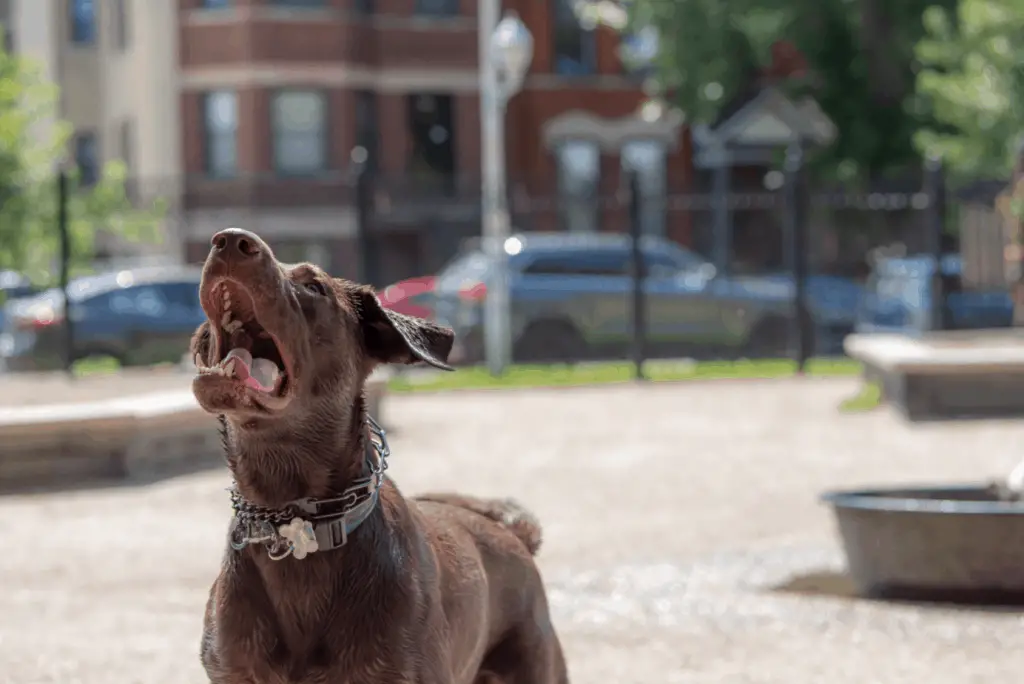
Labradors are the most coveted breed of dog in American families and around the world. Most people who are looking to have a dog at some point consider a Labrador as an option. But, one of the things that worries those who have not had this breed before, is if the Labradors bark a lot. The truth is that all dogs breed, but some breeds bark more than others. Let’s see if Labradors are known to bark a lot.
The truth is that Labradors do not bark much, compared to other breeds such as Beagles, Miniature Schnauzers, or Chihuahuas. Having said that, Labradors belong to the canine family, and all canines “talk” through the language of barking. So, if you have just brought home a Lab puppy, even after getting assurance that labs do not bark excessively, there still might be times when you hear it bark enough to disturb your sleep, and your neighbor’s. Worry not, because there are only specific circumstances when a Labrador barks. Read on to find out more about these reasons and what you can do about them.

What Causes Excessive Barking in Labradors?
Labradors are hard-working, but gentle and social animals. Barking excessively is the last thing they want to do. But when this happens, your lab is trying to tell you something. Here are the most common reasons why your Labrador barks excessively.
Frustration
Frustration is a common problem in puppies and older dogs. Puppies, who have not received enough training, might not realize that they will not always get what it wants, and will start barking as a form of protest, like a child throwing a tantrum. Similarly, older dogs tend to get impatient with little things and if you make them wait for anything, they might get frustrated. This is especially true when for example they are used to receiving a treat and you forget it. Being human, it is easy to brush aside your forgetfulness. But dogs do not necessarily understand that. They end up becoming frustrated and begin to bark at you to remind you that you have forgotten something important to them.
Boredom
Puppies and young adult dogs often get bored when they do not have much to do. Sure, you can have them play around in their comfortable kennel or crate, but labs usually do not like to be confined to one activity for long periods, or worse, no activity for long periods. Labs are active dogs by nature because they are a working breed, and have been for centuries. This trait continues in every generation of Labradors and they need work to do. If there is not enough work for it, it might start barking to let you know that they are bored. If you are too busy yourself, it is not uncommon to ignore the fact that your dog needs to be busy as well. Maybe that is what your lab is trying to tell you through all the seemingly unnecessary barking.
Excitement
All dogs tend to get a bit excited when it comes to meeting strangers, especially if those strangers are just passers-by who do not reappear in the vicinity of the dog. It has something to do with the feeling of reward in dogs. It means that if your lab sees a passer-by once and its excitement causes it to bark at the stranger and then it realizes that the stranger is gone, it might conclude that it was because of its barking. If uncontrolled, this excitement can turn into a routine wherein every time the dog sees a passer-by, it barks to watch the person disappear. The same thing might happen when it sees other dogs, but in this case, the barking usually means that it wants to play with those dogs, not make them disappear.

High Energy
By now, you must have established the fact that Labradors are active dogs. They are of the retriever category, which means that they are always ready to jump into any kind of physical activity you put them through. Your lab is full of vivacious energy, just waiting to hear a cue from you as to how it can put this energy to good use. Sometimes, if it has not been given any task for a few days, this can result in pent-up energy being released in the form of barking.
Separation Anxiety
When you bring a Labrador puppy home, you need to understand that it is still a young one trying hard to accustom itself to the ways of its world, which is you and your home. At this age (around three to six months), the puppy is extremely susceptible to separation anxiety. It finds comfort when you are around and does not know what to make of its surroundings when you are absent. So, if you are someone who is away from home for the majority portion of the day and you have a lab pup, chances are it will bark out of fear and restlessness. As the lab grows older, this anxiety comes down as labs can manage things on their own for a while without you having to accompany them everywhere. Related post: Do Labradors Have Separation Anxiety?
Territorial Instinct
By nature, Labradors are not aggressive. They are friendly, loyal, and great with children and other pets. However, ages ago, they were used as hunting dogs, so some of the aggression might still be dormant in today’s breeds. Labradors can start barking if they perceive a threat to themselves or the family that they are a pet of. If this dormant aggression is ignited once, it can continue to be fueled by further threats and lack of control. Some people tend to take advantage of this trait of the lab and mold them into security dogs that further feed their aggression. The territorial instinct in them rises in such cases. But if yours is a home dog, this instinct can cause unpleasant barking episodes. Related post: Are Labradors Good Guard Dogs?
Attention Seeking
Attention or demand barking is common in those labs that are overly pampered. They always get what they want. So, they begin to bark when they feel that something has not gone their way. Attention barking is a behavioral issue that starts at an early age. If you tend to stop a puppy’s barking by giving them a prize instantly, this translates into negative rewarding, which means, you are not rewarding good behavior, but a bad one instead. As the dog grows up, it gets used to such rewards and begins to think that every time it barks, it will be rewarded. That is why an attention-seeking dog barks all the time it sees you.
Wanting Something
There may be times when the dog wants something. If you are too busy to know what it is, it might try to tell you through barking. Remember, that is how dogs communicate. They cannot express their needs in words. And so, while you may think that you are a responsible owner, even you might end up missing something that your dog reminds you of by barking. Do not beat yourself up for forgetting it. Just try to analyze whether the thing that your dog wants is a genuine need. If yes, give it to them and it should stop the barking. If not, it falls into the category of attention-seeking and the behavior should not be encouraged at all.

How to Stop Your Labrador From Barking Too Much?
Even though Labradors bark less compared to other dogs, as you have read above, there are specific times when they just wouldn’t stop barking. If barking becomes a habit, you must stop it. Even better, you must prevent it so that the dog never gets into excessive barking mode. How can you achieve this? Here are a few tips.
Proper Training
Nothing beats good training in pet dogs. Like all other habits, barking can also be stopped or prevented through early training. Start the training when your dog is a pup. Here is what you can do to train it well. When the puppy begins to bark, check if it is a genuine need. If not, let it continue barking until it stops. Mark the moment it stops with a kind word or a reward. Continue to mark these silences with rewards. The dog will gradually understand that its barking is not getting rewarded, but its silence is. Also, make sure all its true needs are met so that it does not end up barking for want of something.
Provide Entertainment and Exercise
As already established, Labradors are highly energetic dogs. If they are barking due to a lack of activity, give them something to do, like playing fetch in the yard. Be sure to take your dog out for a walk twice a day for half an hour. In addition, make sure that your dog has toys with which he can entertain himself, food puzzles are an excellent option to train your Labrador.
Distraction
It may not always be possible to break down your dog’s activities into minutes, because, let us face it, you have a life as well. If you feel that your lab’s playing time is over and yet you cannot prepare for the next activity because you have to make dinner for your family, do not get anxious. There are still several ways to keep your dog distracted. Give it a chew toy to play with while you make your meal. It is also not a bad idea to keep it in a crate in another room while you do your chores, but be sure to keep the door open so it can see you.
Get Help
If you have tried everything you can to get your lab to stop barking and yet it just goes on and on, there might be some other root cause of the issue. Sometimes an underlying illness can cause your dog to be uncomfortable and that makes them bark incessantly. In such a scenario, excessive barking could be accompanied by other symptoms such as uneasiness, destructiveness, pacing, etc. When you notice any of these symptoms, it is best to consult with a veterinarian. They would then examine your pet for any disease and provide treatment options accordingly.

You Are Its Best Friend
The old saying goes something like, “a dog is a man’s best friend”. But do not forget that when you bring your adorable lab home as a pet, from that moment on, even you are its best friend. No matter what the reason is behind your lab’s excessive barking, it is often a sign your dog is trying to make, hoping you, its best friend, will have a solution. Once you get to the bottom of it, it is easy to stop your dog from barking and watch it become a happy, friendly, and loyal friend again.
Related post: Are Labradors Good Guard Dogs?
References:


